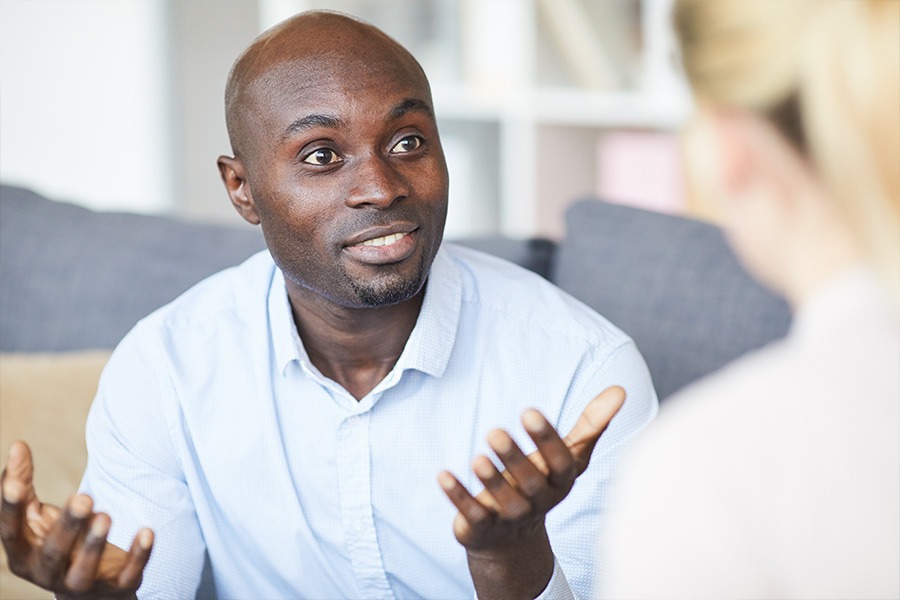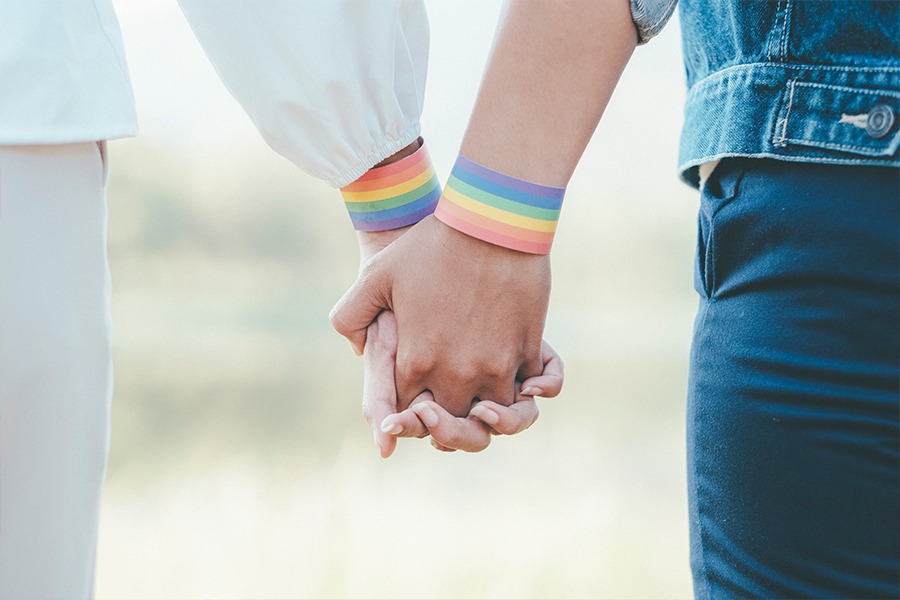LGBTQ+ & Gay-Friendly Rehab Centers
Living in a community that has been rejected as long as the LGBTQ+ community has is difficult to say the least. For those who have experienced discrimination because of their gender identity or sexual orientation, it seems hopeless. To cope, some individuals may find themselves turning to substance abuse. For those who have done so, it’s not too late. At First City Recovery Center, our mental health treatment in Indiana supports people from all walks of life and those from all communities.
Table of Contents
ToggleThe Difficulties of Living as an LGBTQ Individual

Living as an LGBTQ+ individual often comes with an array of unique challenges and difficulties. These can range from societal prejudice and discrimination to personal struggles with identity acceptance. Some LGBTQ+ individuals face rejection from their family or community, which can lead to feelings of isolation and loneliness.
The fear of being outed can also result in stress and anxiety. Furthermore, they are often subjected to hate crimes and unfair treatment in workplaces, schools, and other public spaces. These hardships not only pose a threat to their mental health but also impede their ability to fully participate in society.
The rejection faced by LGBTQ+ individuals from their communities can be largely attributed to deep-seated societal norms and prejudices. Many societies around the world still uphold traditional beliefs around gender and sexuality, viewing any deviation from heteronormativity as abnormal or immoral. This, coupled with a lack of understanding and awareness about LGBTQ+ identities, often results in these individuals being marginalized and excluded from their communities.
In many cases, this rejection is also rooted in religious beliefs or cultural norms that deem homosexuality and other non-cisgender identities as unacceptable. It’s a complex issue that underscores the necessity for education, open dialogue, and acceptance in our societies.
Why is it Difficult to Live as an LGBTQ Individual?
Living as an LGBTQ+ individual can be challenging due to a host of societal, legal, and personal hurdles. In many global societies, they face stigmatization, discrimination, and sometimes even violence due to their sexual orientation or gender identity. Legal barriers in certain countries or states can also limit their rights, restricting them from equal access to marriage, adoption, or healthcare.
On a personal level, the journey of self-acceptance and coming out to family and friends can be emotionally taxing. Furthermore, lack of representation and understanding can lead to feelings of isolation and loneliness. However, it’s essential to remember that progress is being made, with growing societal acceptance and legal protections in many places worldwide.
Does the Trauma of Facing Discrimination as a Member of the LGBTQ Community Impact Substance Abuse?
Research suggests a significant correlation between the trauma of facing discrimination as a member of the LGBTQ+ community and the incidence of substance abuse. Individuals within this community, who often face prejudice, may resort to substance use as a coping mechanism. They may do this to mitigate feelings of anxiety, distress, and isolation. This pattern underscores the importance of fostering an inclusive, understanding society. Every individual has a right to feel valued and accepted, regardless of their sexual orientation or gender identity. Which is why we offer anxiety counseling in Kokomo, Indiana – and support for most mental health issues for those looking for treatment.
How Does Trauma Influence Substance Use Disorder?
Trauma, particularly when experienced in one’s formative years, can wield a significant influence on the development of substance use disorders. This connection hinges on the concept of ‘self-medication’; this is where individuals seek temporary relief from the emotional pain and distress triggered by traumatic events through substance use.
Alcohol is often utilized as an emotional suppressant, especially in the context of repressed trauma symptoms. Individuals may turn to alcohol as a means of coping, using its psychoactive effects to mask the intense emotions and memories associated with their trauma. This numbing effect provides a temporary escape from the daunting realities they face, creating a false sense of relief or detachment. However, this approach to coping does not address the root cause of the emotional pain, but instead potentially exacerbates it, often leading to a vicious cycle of increasing dependency on alcohol.
The repeated use of substances as a coping mechanism can lead to physical dependence and addiction, birthing a substance use disorder. Furthermore, the presence of a substance use disorder can exacerbate the symptoms of trauma, creating a vicious cycle that can be challenging to break without professional intervention.
How Does Trauma Influence Depression in the LGBTQ Community?
Trauma often acts as a catalyst for depression by triggering a series of biochemical changes within the brain. Exposure to traumatic events can result in sustained levels of stress hormones, such as cortisol, which can impair the function of neurotransmitters that regulate mood. Furthermore, trauma can lead to alterations in the brain’s structure and function, particularly in areas associated with emotion and memory. This can increase an individual’s vulnerability to depressive episodes and influence the severity and duration of the symptoms experienced.
How Does Trauma Influence Anxiety in the LGBTQ Community?
Trauma can be a significant contributing factor in the development of anxiety disorders. Experiencing traumatic events, especially those that occur repeatedly or over a long period, can trigger the body’s stress response system and lead to chronic feelings of fear and worry. This is due to the brain’s neuroadaptive response, where it becomes hyper-vigilant to potential threats in an effort to avoid future trauma. This heightened state of alertness can manifest as anxiety, with symptoms such as persistent worry, restlessness, and physical symptoms like rapid heart rate or insomnia.
Dual Diagnosis and the LGBTQ Community
Dual diagnosis is a prevalent issue within the LGBTQ+ community, referring to the co-occurrence of substance abuse disorders and mental health issues. Individuals in the LGBTQ+ community often face unique pressures, including discrimination, stigma, and societal misunderstanding, which can contribute to increased rates of depression, anxiety, and substance use. It’s crucial that healthcare providers, including those specializing in depression counseling in Indiana. approach treatment with sensitivity and understanding, acknowledging the complexities of dual diagnosis in the LGBTQ+ community and striving to offer holistic, inclusive care.
LGBTQ Substance Abuse: by the Numbers
According to a report by the Substance Abuse and Mental Health Services Administration (SAMHSA), individuals who identify as LGBTQ are more likely to engage in substance use and experience substance use disorders (SUDs) compared to their heterosexual counterparts. Approximately 20-30% of the LGBTQ population have engaged in substance misuse, as opposed to around 9% in the broader population.
LGBTQ individuals have also been found to be three times more likely to experience a substance use disorder in their lifetime. The high prevalence of substance misuse in the LGBTQ community underscores the need for specialized intervention strategies and support systems to address this significant public health issue.
How Does LGBTQ Discrimination Impact the Community in Relation to Substance Abuse?
Discrimination against the LGBTQ+ community has substantial implications, particularly contributing to heightened rates of substance abuse among its members. Experiences of bias, prejudice, and social exclusion often lead to mental health issues (as previously mentioned). These mental health strains can, in turn, increase the likelihood of substance misuse as a coping mechanism. Members of the LGBTQ+ community are thus at a higher risk for substance abuse compared to their heterosexual counterparts. This is a troubling disparity largely driven by the discriminatory attitudes and practices they endure.
Treatment Options for the LGBTQ Community

The LGBTQ community often faces unique challenges in accessing substance abuse treatment, necessitating specialized approaches. One such approach is the use of LGBTQ-affirming treatment programs. These programs are designed to provide a safe, non-judgmental environment where individuals interact with therapists and peers who understand their experiences. These programs often incorporate individual and group therapy. In these treatment arenas, people discuss their substance abuse issues in the context of their sexual orientation or gender identity.
They may also offer family therapy, addressing the complexities of family dynamics within the LGBTQ community. Additionally, holistic treatment methods such as mindfulness, yoga, and art therapy can be employed. These focus on overall wellbeing, stress management, and emotional expression. It should be noted that the choice of treatment should always be individualized, respecting the unique needs and circumstances of each person.
Why Do Some People in the LGBTQ Community Not Go to Treatment?
Certain members of the LGBTQ+ community may refrain from seeking treatment due to a variety of complex reasons. The primary ones include fear of stigma, discrimination, and misunderstanding within healthcare settings. Unfortunately, some healthcare professionals lack the necessary training to understand the unique needs and experiences of the LGBTQ+ community, resulting in inadequate or insensitive care.
Previous negative experiences or hearing about such experiences from others can discourage individuals from seeking help when they need it. Lastly, the lack of representation and inclusivity in healthcare marketing and communications can make LGBTQ+ individuals feel unseen and unwelcome. It’s crucial that these barriers are acknowledged and addressed to ensure everyone has access to the care they need.
First City Recovery Center is LGBTQ Friendly
At First City Recovery Center, we want to help people become the best versions of themselves regardless of their sexual orientation. Trauma is not easy to walk through alone, and neither is dealing with addiction. This is why we offer LGBTQ and gay-friendly rehab centers for those looking for a safe space. If you or a loved one would like to find out more, you can contact us here.

MD, Psychiatrist
Dr. Vahid Osman, MD is a psychiatry specialist in Indianapolis, IN.
Dr. Osman completed a residency at Austin State Hospital. He has over 32 years of experience in Psychiatry & Behavioral Health. He is board certified by the American Board of Psychiatry and Neurology.




